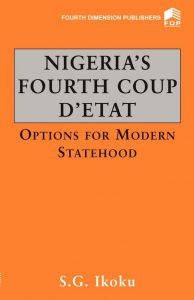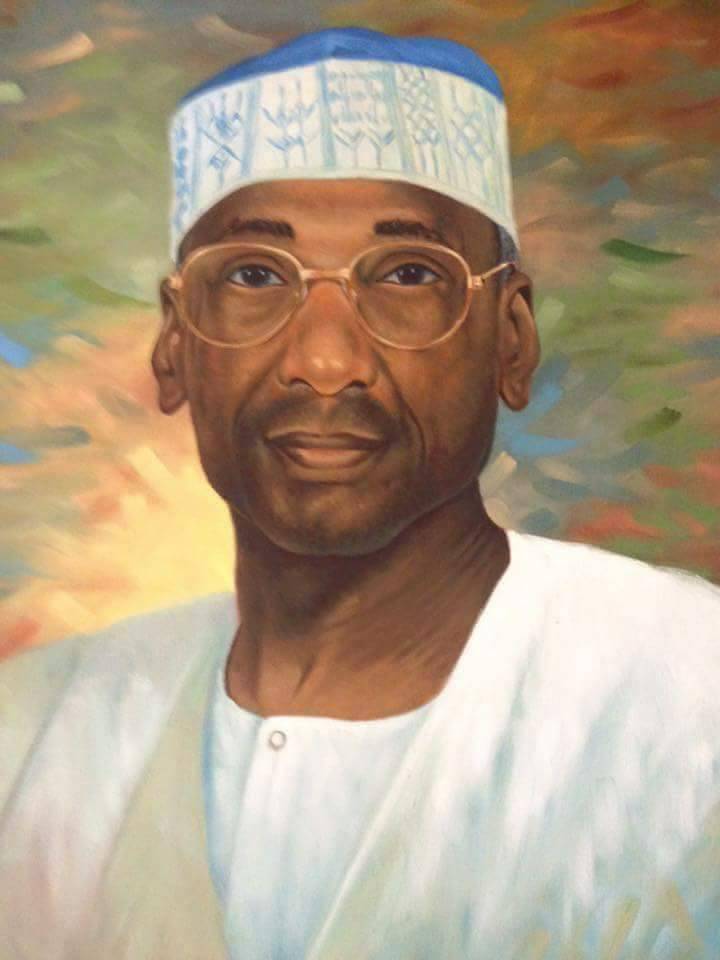Access is power. The messenger with access to the king has powers far beyond his or her designation. Whether he or she is aware of that much of power is a different thing. In Nigeria, people with such powers convert it to personal advantage or become drunk with it, producing no social effect. There are three exceptions in terms of immediate recollection.

One of the late S G Ikoku’s books in the absence of his own pix
One is the late Sam Ikoku. He was Political Adviser to the equally late General Abacha. It is not clear how he became a close aide of Gen. Abacha but they were certainly close. They agreed with each other completely in terms of what they considered as appropriate response to foreign control. Ikoku, a product of Nkrumah’s Ideological School and an expert in Development Strategy, developed a native sense of anti-imperialism in Abacha by telling him repeatedly that orthodox SAP and slave trade came from a same root. He told the story of what he told Abacha on that subject to journalists at the Government House, Kawo-Kaduna at a conference organised by the late Dr Sabo Bako’s Centre in late 1996. Dr Sabo Bako, the ABU, Zaria Political Scientist who is now late had himself been an adviser to the now late Senator Uche Chukwumerije where he got to know and obviously liked Ikoku.
To cut a long story short, Ikoku’s closeness to Abacha and total powers over Abacha’s political transition is the reason some people argue that Abacha’s transition agenda actually collapsed the moment Ikoku suddenly died in April 1997. There was no one left to manage it in any other direction than the chaos it became. Abacha’s self-succession agenda was as problematic as it came but Ikoku’s use of power of access was not for private gain.
There was another Samuel who was close to Abacha. That was the Economics professor, Sam Aluko. He was the economics side of Ikoku and Gidado Idris has said in one of his interviews that Abacha would suspend everything at some point to wait for a presidential aircraft to go, pick Sam Ikoku before the discussion could continue. Many people wondered how it was possible for the Economic Adviser to the Head of State to rubbish what the Finance Minister would be saying on the budget. It was the signal that Aluko had the better ear of the Head of State and whose direct and indirect approval gave him the authority to publicly countermand any economic policy he considered slavish.
The third case study would be Alhaji Gidado Idris. The only difference is that he was not called Samuel. Otherwise, he was a man of power, a heritage built up much, much earlier than Abacha’s era. He was a Sardauna man – having served power closely at that level and been what Daily Trust calls a “Witness to several key moments of Nigeria’s history”, (April 4th, 2015). By his own testimony, he usually met with Abacha every weekend, either Saturday or Sunday. There might be nothing reeking of power in this but in the same interview, he spoke of how Gen Abdulsalami Abubakar met him a few days before Abacha died to inform him of a decision to depart ahead of his advance information that he was to be retired by Abacha in the week ahead. His response to Abdulsalami was not to take that option, with the hint of using his next weekend meeting with Abacha to find out what the problem might be. In other words, he was skillful in using the meeting to advantage. But it would not have been personal advantage if Abacha had not died and he had been successful in reversing Abdulsalami’s planned retirement.

Gen. Yakubu Gowon @ the launching of Bamaiyi’s book in which he made the claim about the now late Gidado Idris
Of course, one must take note of contradictions in the exercise of power where the power is by association. One such case is what General Ishaya Bamaiyi recollects in his Memoirs, Vindication of a General. In it, the former Chief of Army Staff tells the story of how his own crisis of power got worse by the day, especially his decision to embark on a tour of army formations to clear the air that there was self-succession agenda.
According to him, it was while on that tour that the plot thickened to his chagrin as the campaigns heated up, with a 2 million-man match gathering steam and all the political parties were adopting Abacha as their candidate in the impending election. So, he went to Abacha to kick against it, whereupon Abacha told him he (Bamaiyi) alone had spoken to him on the issue like that, an ominous censor. But he pursued the matter to Gidado Idris, the Secretary to the Government of the Federation whom he regarded as principled and courageous. Gidado took up the issue with Abacha, probably at one of the weekend meetings but nearly got himself sacked because “Abacha was furious with Idris and almost removed him as SGF”, (p. 44). This forms the basis of the author’s claim that if there was anybody Abacha would have punished for opposing self-succession, it would have been Idris, not any military officer whom he had the power to retire.
Gidado Idris might not have been an innocent player in the theatre of power but he seemed to be a specimen of those that even radicals and principled elements in Nigeria today speak of as non-existent anymore in government. In other words, though not a radical or claimant of progressive tendency, he was in that class of technocrats that were approached behind the scene by all manner of people and once they understood what was at stake, they made it their own battle by taking the issue up with the Commander-in-Chief or whoever to get the government of the day to do something. Whether any group should go through any individual(s) to access government is debatable but it is doubtful if there would be a time soon that operating from behind the scene would no longer be a feature in managing public affairs. It would, therefore, be considered part of the crisis in Nigeria if governments are now composed in such a way that is bare of people like the now departed ex-Secretary to the Government of the Federation. May his soul rest in peace!



























